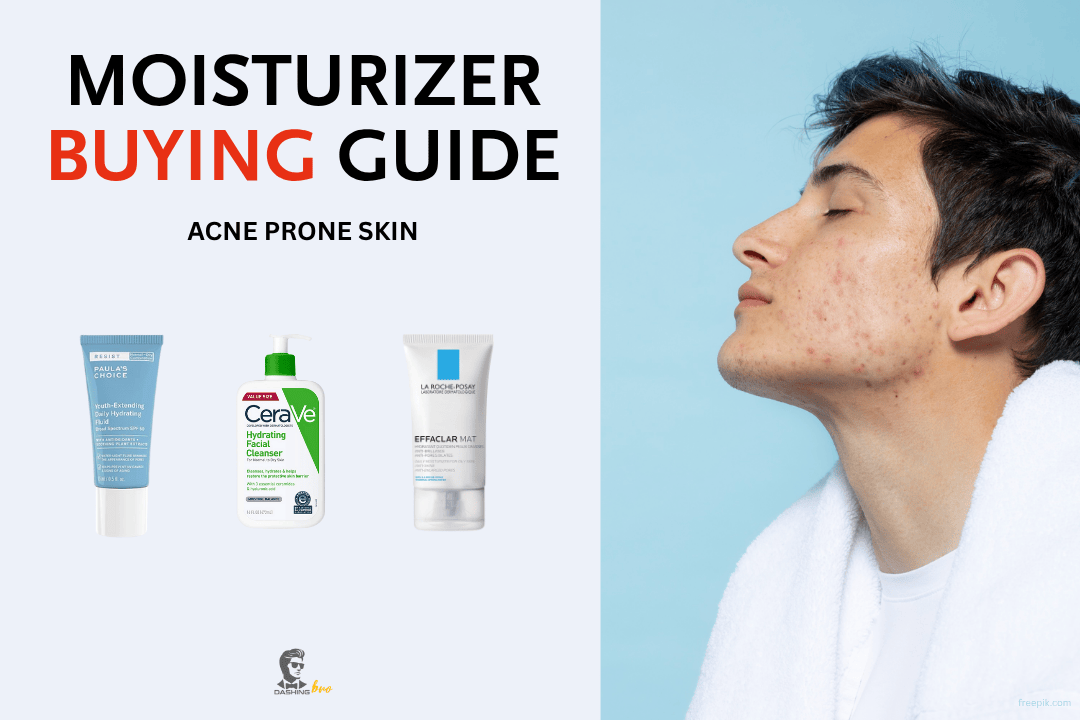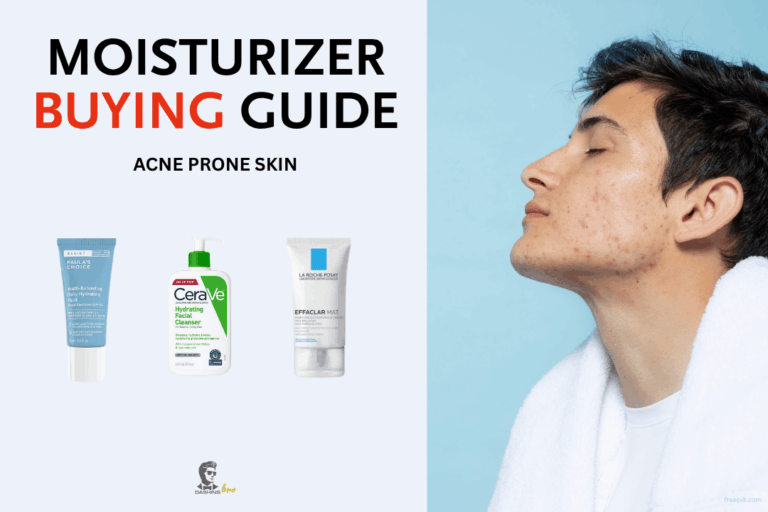
Can Men Use Skincare Products Labeled for Women? The must-know truth
Ever stood in the skincare lane, eyeing those “women’s” products and wondering, “Can men actually use skincare products labeled for women?” Trust me, you’re not alone. Most guys have been there—maybe your girlfriend’s serum looks tempting, or your sister swears by a moisturizer that’s not labeled “for men.” The truth? Skincare doesn’t care about gender, and your skin just wants what works.
Let’s break down the myths, benefits, and best practices—so you can confidently grab whatever works best for you, regardless of the label.
Why Men Wonder About “Women’s” Skincare
It’s a common pain point: you want to take care of your skin, but the shelves are packed with products in pink bottles, floral scents, and promises of “radiance.” The men’s section, meanwhile, is tiny and often just offers a basic face wash and a heavy moisturizer. So, is it okay to use skincare products labeled for women? Absolutely.
Picture this: you’re at the store, and you see a face cream that has amazing reviews and seems perfect for your dry skin. But it’s in a rose gold package with “for her” written all over it. Your first instinct might be to put it back and settle for the one “manly” option available but you may not find enough products, that your skin requires, marketed specially for men.
The reality is that the beauty industry has conditioned us to think skincare needs to be gendered, when in fact, good skincare is universal. Your skin doesn’t have a gender preference—it just wants to be healthy, protected, and nourished. Therefore, you can undoubtedly use skincare products labeled for women.
The Truth: Skin Is Skin
Here’s the thing—most skincare products are formulated based on skin type (oily, dry, sensitive, combination) and concerns (acne, aging, dullness), not gender. The main differences between men’s and women’s skincare lines are usually:
- Packaging and fragrance (think musk vs. floral)
- Marketing language
- Sometimes, texture (men’s products may be lighter, as men’s skin tends to be oilier)
However, the key ingredients—such as hyaluronic acid, vitamin C, retinol, and niacinamide—remain consistent across most products. So if a product addresses your skin’s needs, it doesn’t matter who it’s “for.”
The Science Behind Gender-Neutral Skincare
Let’s get into the nitty-gritty for a moment. Dermatologically speaking, men’s and women’s skin do have some differences, but they’re not as dramatic as marketing would have you believe. Men typically have:
- Thicker skin (about 25% thicker than women’s)
- More sebum production (thanks to higher testosterone levels)
- Larger pores
- More collagen (which breaks down slower with age)
But here’s what matters more than these differences: your individual skin type and concerns. A man with dry, sensitive skin has more in common with a woman who has dry, sensitive skin than he does with another man who has oily, acne-prone skin.
Benefits of Using Skincare Products Labeled for Women
1. More Options, Better Results
Women’s skincare lines often have a wider variety of products, targeting everything from dark spots to fine lines to hydration. This means more choices to find what really works for your skin. While the men’s section might have three moisturizers, the women’s section could have thirty—each targeting different skin concerns and types.
2. Advanced Formulations
Many “women’s” products feature cutting-edge ingredients and technology, since the market is so competitive. You get access to the latest innovations, whether it’s a super-hydrating serum or a gentle exfoliating cleanser. The women’s skincare market drives much of the innovation in the beauty industry, so you’re essentially getting first access to the best new ingredients and formulations.
3. Solutions for Every Skin Concern
Whether you’re battling acne, dryness, or signs of aging, skincare products labeled for women often offer more specialized solutions. For example, if you have sensitive skin, you’ll find fragrance-free and hypoallergenic options galore. Need something for dark circles? There are dozens of eye creams specifically formulated for that concern.
4. Better Value
With more brands and products to choose from, you can often find higher quality at a better price point—especially if you shop around or look for sales. The competition in the women’s skincare market means brands are constantly trying to offer better value to stand out.
5. It’s All About the Ingredients
At the end of the day, your skin doesn’t know if a moisturizer came in a pink jar or a black tube. It just wants hydration, nourishment, and protection. A vitamin C serum works the same way regardless of who it’s marketed to.
Debunking Common Myths About Men Using “Women’s” Products
Myth 1: “Women’s Skincare Is Too Weak for Guys”
This is completely false. In fact, many skincare products labeled for women are formulated to be more potent because they’re designed to address specific concerns. A retinol cream marketed to women is just as effective for men—sometimes more so than the watered-down versions in men’s lines.
Myth 2: “It Will Make Me Look Feminine”
Using good skincare products will make you look healthier and more put-together, not feminine. Clear, healthy skin is attractive on everyone, regardless of gender. Plus, many skincare products labeled for women come in neutral packaging or have unisex versions.
Myth 3: “Men Don’t Need Anti-Aging Products”
Men age too, and often they start showing signs of aging later but more dramatically due to years of sun exposure and neglect. Anti-aging ingredients like retinol, peptides, and antioxidants work just as well on men’s skin.
Myth 4: “Women’s Products Are Too Expensive”
While some luxury brands can be pricey, there are excellent affordable options in skincare products labeled for women. Plus, when you consider the cost per use and the results you get, quality skincare is always a good investment.
How to Choose the Right Skincare Product (No Matter the Label)
Many men find that using skincare products labeled for women significantly improves their skin’s appearance and texture. Using skincare products labeled for women is not only acceptable but also beneficial for those seeking effective solutions.
Step 1: Identify Your Skin Type
Is your skin oily, dry, combination, or sensitive? This is the most important factor in choosing products. Here’s a quick test: wash your face with a gentle cleanser, wait an hour without applying anything, then observe:
- Oily: Shiny all over, especially T-zone
- Dry: Tight, flaky, or rough feeling
- Combination: Oily T-zone, normal to dry cheeks
- Sensitive: Easily irritated, red, or reactive
Step 2: Read the Ingredients
Look for actives that target your main concerns:
- Salicylic acid for acne and blackheads
- Hyaluronic acid for hydration
- Retinol for anti-aging and skin texture
- Niacinamide for oil control and redness
- Vitamin C for brightening and antioxidant protection
Step 3: Ignore the Hype
Don’t get distracted by gendered marketing. Focus on what the product actually does. Read reviews from people with similar skin types and concerns, regardless of their gender.
Step 4: Patch Test
Always try a new product on a small area first, especially if you have sensitive skin or if you are concerned for any side effect. Apply a small amount behind your ear or on your inner wrist and wait 24-48 hours to see if you react.
Step 5: Start Slow
When introducing new products, especially active ingredients like retinol or acids, start with using them every other day or a few times a week. Your skin needs time to adjust.
Common Questions Guys Ask
Will it make me smell like flowers?
Not unless you pick a heavily fragranced product. Many skincare products labeled for women are unscented or have a neutral scent—just check the label. Look for products labeled “fragrance-free” or “unscented” if you’re concerned about smell.
Is it too “light” for men’s skin?
Not necessarily. If you have oilier skin, look for gel-based or oil-free formulas. If you’re dry, go for richer creams. The key is matching the product to your skin type, not your gender.
Can I use my partner’s skincare products labeled for women?
Absolutely—just make sure it suits your skin type and concerns. This is actually a great way to test products before buying your own. Just remember to replace what you use!
Will people judge me for using skincare products labeled for women?
Honestly, most people won’t even notice or care. And if they do? Let their judgment speak for them. There’s nothing wrong with taking care of yourself—it’s a sign of self-respect, not weakness.
Building Your Routine: A Step-by-Step Guide
Morning Routine:
- Gentle cleanser (removes overnight buildup)
- Vitamin C serum (antioxidant protection)
- Moisturizer (hydration and barrier protection)
- Sunscreen (SPF 30+ broad spectrum)
Evening Routine:
- Cleanser (removes daily grime and sunscreen)
- Treatment product (retinol, acids, or targeted serum)
- Moisturizer (nighttime repair and hydration)
Start with this basic routine and add products as needed based on your specific concerns. Remember, consistency beats complexity every time.
Skincare Recommendations for Men (Yes, Even from the “Women’s” Section)
Here are some tried-and-true options that work for everyone:
Mild Cleansers: Look for ones that say “fragrance-free” or “made for sensitive skin” on the label. Gel-based cleansers are ideal for oily skin types, while cream cleansers tend to hydrate and soothe dry skin more effectively.
Moisturizers: Hyaluronic acid or ceramide-based creams are great for hydration. If you are prone to breakouts, stick with formulas that are light and labeled non-comedogenic—they’re less likely to cause clogged pores.
Serums: Vitamin C for brightening and protection, niacinamide for oil control and redness, and retinol for anti-aging and texture improvement.
Sunscreen: Always opt for broad-spectrum SPF 30 or higher, regardless of gender. Mineral sunscreens are great for sensitive skin, while chemical sunscreens tend to be more cosmetically elegant.
Eye Cream: Yes, men can use eye cream too! The skin around your eyes is thinner and more delicate, so it benefits from specialized care.
The Economics of Good Skincare
Let’s talk money for a minute. Some guys balk at spending $30-50 on a good moisturizer when they can get a basic one for $5. But here’s the thing: that premium moisturizer will likely last you 3 to 4 months with daily use. That’s about $0.50 per day for better skin. You probably spend more than that on coffee.
Plus, investing in quality skincare today can actually save you money over time. Prevention is always cheaper than correction. Those expensive dermatologist treatments, laser procedures, and corrective treatments cost way more than a solid skincare routine.
Ready to Upgrade Your Routine?
Don’t let a label hold you back from healthier, better-looking skin. The best skincare routine is the one that works for you—and sometimes, that means reaching for a product that doesn’t have “for men” on the bottle.
The truth is, good skin is good skin. Whether you’re 25 and trying to prevent breakouts or 45 and concerned about aging, the right products can make a significant difference. And those right products might just be sitting in the “women’s” section.
Start your skincare journey with the following beginner friendly products:
Facewash
Toner
Moisturizer
(Affiliate Disclosure: We may earn a small commission without you needing to pay extra.)
Start building a routine that’s all about results—not marketing. I’ve personally tested dozens of products and selected the ones that deliver real results for men’s skin concerns.
Final Thoughts
Don’t overthink it—your skin wants care, not labels. If you are getting good results, stick with it! The only rule: listen to your skin and choose what makes you look and feel your best.
As you explore, remember that skincare products labeled for women are designed with effectiveness in mind.
Remember, taking care of your skin isn’t vanity—it’s self-care. Skin being our body’s biggest organ, it is also fist thing which interacts with the environment. Therefore, it deserves the best care you can give it, regardless of what aisle that care comes from.
The skincare industry is slowly catching up to what dermatologists have known all along: skin is skin. While there might always be gendered marketing, the actual science behind skincare is universal. So next time you’re in the skincare aisle, shop with confidence. Your skin will thank you for it.
If you have any questions or want personalized product suggestions, just drop a comment below—I’m always happy to help a fellow guy level up his grooming game!
In summary, don’t overlook skincare products labeled for women; they may be the key to achieving your desired skincare goals.


